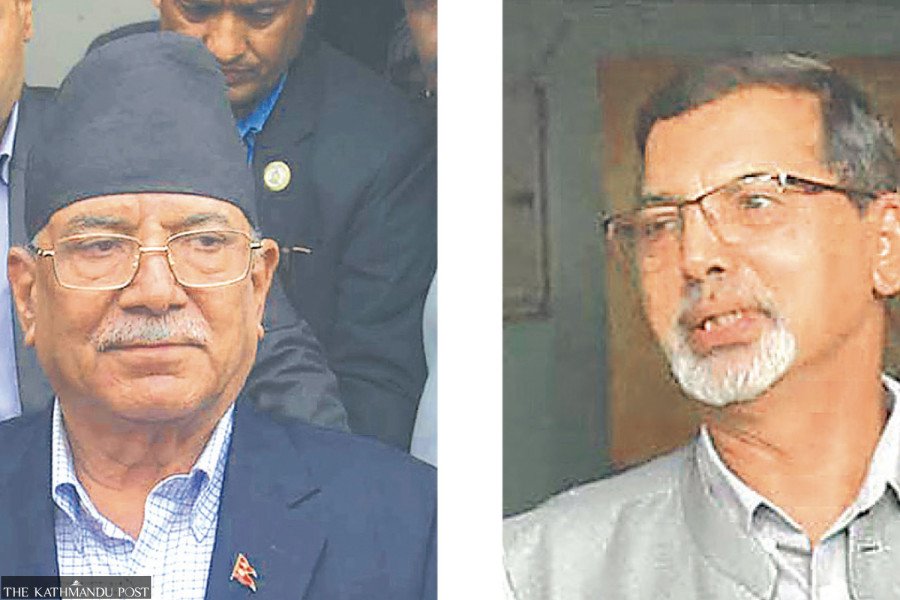Politics
Temporary truce reached in Maoist Centre
Deputy General Secretary Janardan Sharma didn’t concede ‘self-criticism’ despite leaders’ pressure for it.
Post Report
All eyes were on deputy general secretary Janardan Sharma when the Standing Committee meeting of the CPN (Maoist Centre) kicked off on Friday.
He drew the attention as his recent statements aimed at Chairman Pushpa Kamal Dahal sparked a debate in the party.
Sharma’s remarks at a public function claiming that no communist prime minister except for Manmohan Adhikari come clean in Nepal caused a sensation in the Maoist party.
Nepal has had six communist prime ministers–Adhikari, Dahal, Madhav Kumar Nepal, Baburam Bhattarai and KP Sharma Oli. Dahal became the prime minister three times starting with his first stint in 2008.
“All communist prime ministers extorted money and funds,” Sharma dropped a bombshell at a public function on July 22 in Kathmandu. Moreover, Sharma raised the issue of ‘weakening internal democracy’ and a crumbling organisation in the Maoist party. He squarely held party chair Dahal responsible for the party’s decline.
Sharma repeated this at Sunday’s standing committee meeting, where he asked: “During the first Constituent Assembly elections in 2008, the party got over 3.1 million votes. Where have those votes and public support gone? Who is responsible for this decline?”
The Maoists emerged the largest party from the first Constituent Assembly elections, in its first public test after joining peaceful politics in 2006. The party had just ended its decade-long armed struggle against the state.
But the Maoist party could not retain the public support in subsequent general elections. Now the party has been relegated to a distant third position, after the Nepali Congress and the CPN-UML.
Despite 98 percent of standing committee members asking Sharma to record “self-criticism” over a series of statements he has made against the party leadership, he refused to do so.
The standing committee meeting ended on Monday without Sharma conceding a “self criticism”. Dahal and several other standing committee members had demanded it. Confession of one’s mistakes is an established practice in a communist party to gain its forgiveness.
“No, Janardanji [Sharma] has not self-criticised,” said party spokesperson Agni Prasad Sapkota.
Dahal enjoys a strong support of the standing committee members, most of whom had advised Sharma to “apologise” for his remarks. But Sharma did not oblige.
His depth of self realisation has increased though he has not relented to “self criticism” as such, said Sapkota. The matter would eventually be settled through discussion.
Sharma was at the centre of attention throughout the meeting, with discussions revolving around whether he will “apologise” or not.
Despite repeated requests from Dahal, party’s office bearers and members, Sharma did not decide to “self criticise”, a standing committee member said.
“If you have realised that you made a mistake, you have to demonstrate self-criticism as per the spirit of the meeting,” Dahal told Sharma on Monday as well. But Sharma firmly rejected the proposal.
“My position has not changed and I only take responsibility for my weakness,” said Sharma. “We all made a mistake so everyone here is owes self-criticism.”
Sharma however acknowledged having not signed the party’s minutes over a stretch of four years.
On Monday, Sharma signed the minutes of the standing committee decisions. He clarified that he had not signed the minutes earlier as the issues he raised were not discussed in the past meetings. “But this time, the issues I raised were discussed so I am going to sign the minutes.”
The meeting also warned Sharma not to speak about the party's internal matters in public forums.
“In sum, we have reached a temporary truce in the party but I cannot say how long it will last because Janardan ji did not commit to anything in the meeting,” a standing committee member said.
Responding to journalists’ queries briefly after the meeting, Dahal said he was committed to fulfilling the responsibility of unifying various Maoist parties.
The party has decided to reunify the Maoist Centre with the Nepal Communist Party led by Netra Bikram Chand, who leads one of the factions that split from the Dahal-led Maoist party in 2012.
The Maoist Centre has decided to form a talks committee soon in order to hold talks with the Chand-led party.
“Our party played the most important role for the establishment of democratic movement and the republic,” said Dahal.
He said that the party has emerged further united from the standing committee meeting. “We have made a collective commitment, and resolved to ending all kinds of factionalism and groupism with a stronger unity,” he said. “We have collectively committed to this.”
After the meeting, Dahal also said that a decision had been reached to launch another campaign to address the problems currently facing the country.
Sharma told reporters that the standing committee discussed various issues ranging from political and organisational matters.
“Serious discussions were held on all agendas. Important conclusions have been drawn on ideological, political, organisational, and procedural matters.”
The meeting also made 26 decisions related to national issues. The party has rejected a proposal to hold a special general convention while the meeting decided to convene the Central Committee only after Dashain.




 14.12°C Kathmandu
14.12°C Kathmandu













